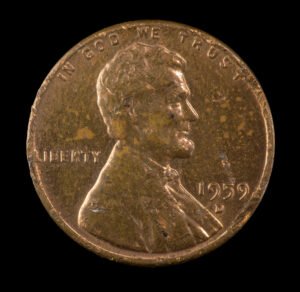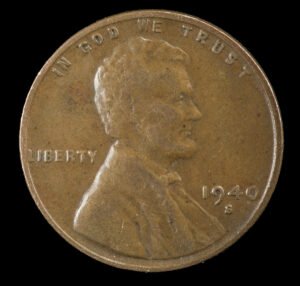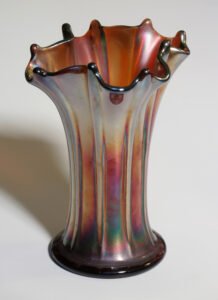Vintage ceramic lovers, including myself, are always on the lookout for precious Roseville pottery. But with the rise of reproduced and fake Roseville pieces since the 1990s, it has become complicated for collectors to spot a REAL piece.
Besides, with different types of Roseville marks found on pottery, dating them is equally a daunting task. But not anymore!
This detailed guide to Roseville Pottery Company Marks with hand-drawn illustrations of labels, marks, & stamps (referring to real Roseville pieces) will help you identify & date your piece with ease!
A Brief History of Roseville Pottery Marks
Since its inception in 1892, Roseville Pottery Company has marked its products in different ways. These company marks and labels help collectors today in identifying and date valuable Roseville Pottery.
So, the company started labeling their products in 1896 with shape numbers, often in cursive style digits, and scroll paper labels with RPCo lettering.
Starting from the 1900s with the rise of the Rozane line, the labeling changed to raised marks of “ROZANE” along with the shape numbers and “RPCo” initials. Soon, the company switched to round “ROZANE” wafer marks with pattern names.
From the 1910s, the Roseville pieces were manufactured with the deep blue ink mark “Rv” and dark gray Roseville Pottery paper/foil labels. Many pieces from the mid to late 20s have just a shape number marked with crayons.
Since the 1930s, the company has used a few Roseville incised marks as well as raised marks, with and without “U.S.A” until its shutdown in 1954.
Here’s a detailed year-wise overview of Roseville Pottery factory marks and labels with hand-drawn marks:
1. 1896-1900 Roseville Factory Marks:
The earliest Roseville pottery, especially Roseville Brown Assorted Vases, simply have a low-raise impressed shape number mark. Besides this, the Roseville Pottery Company used the following labels during 1896-1900:

Roseville Vase Assortment products are also sometimes found with the RPCo. Scroll label.
2. 1900s Roseville Pottery Labels & Marks:
The early 1900s Roseville pieces can be seen with a rectangle paper label at the bottom, while the later ones have in-mold logos & numbers, including the Rozane wafer marks.

Many 1900-04 Roseville pieces are found with a rectangle ROSEVILLE POTTERY CO./ ZANESVILLE. O.” paper label with details like shape number, size, and price.

This mark of Rozane stamp with size numbers and RPCo stamp was usually found on the 1900-1904 Rozane brown-ware.
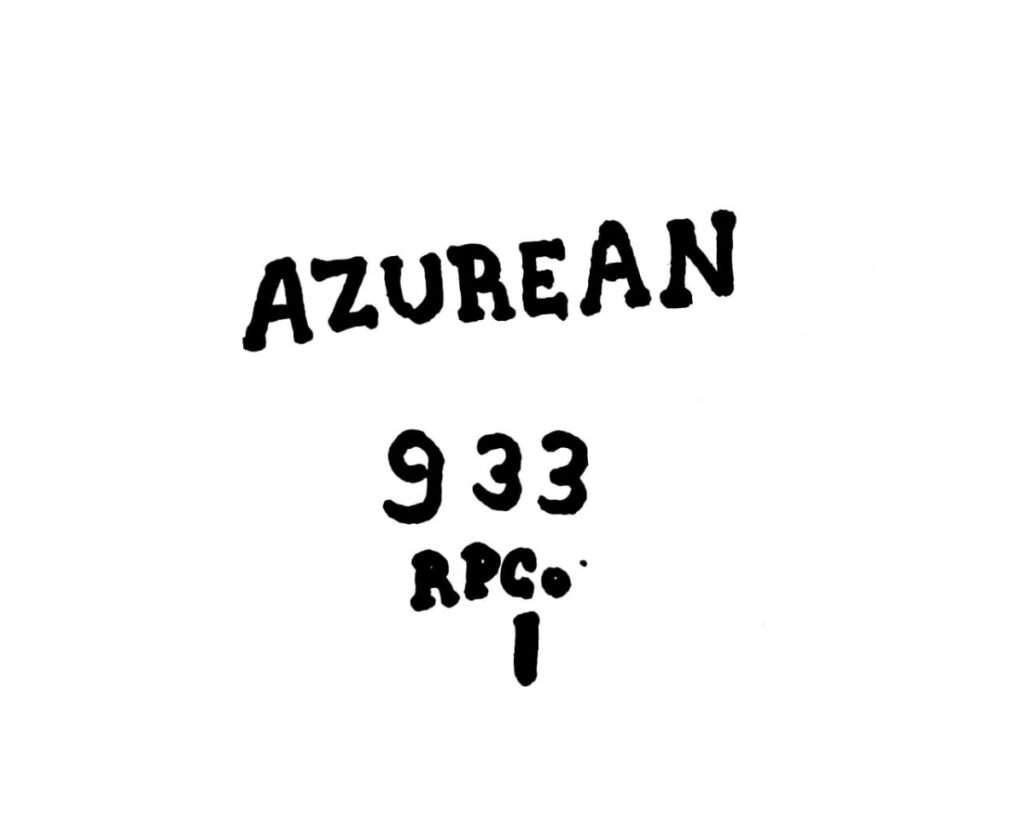
Roseville Azurean Rozane pottery, dated 1904-04, has a typical incised “AZUREAN” mark with “RPCo” and shape number. This pottery may also have a “ROZANE” mark.

The Roseville Chloron line, started in 1905, has a hand-signed stylized CHLORON mark along with the RPCo mark.
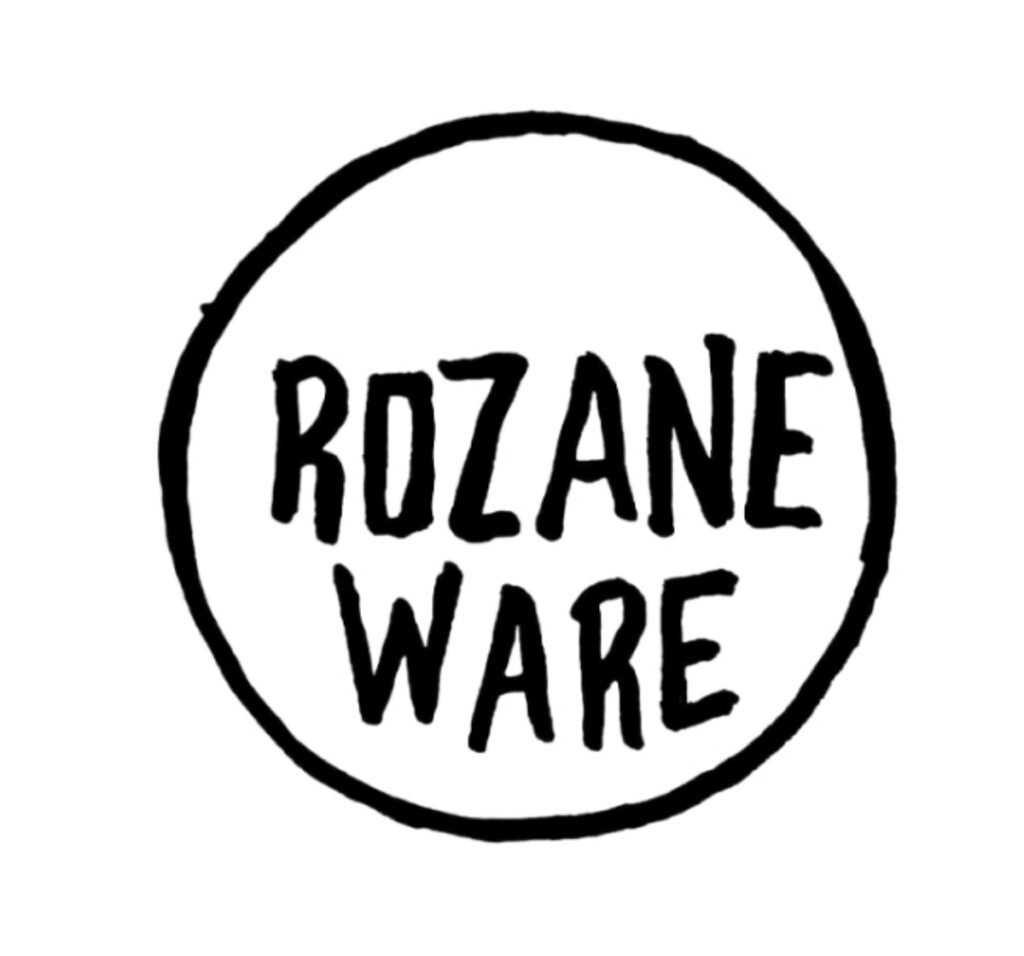
Many Rozane items manufactured during 1905-08 were marked with a raised ROZANE WARE wafer mark.
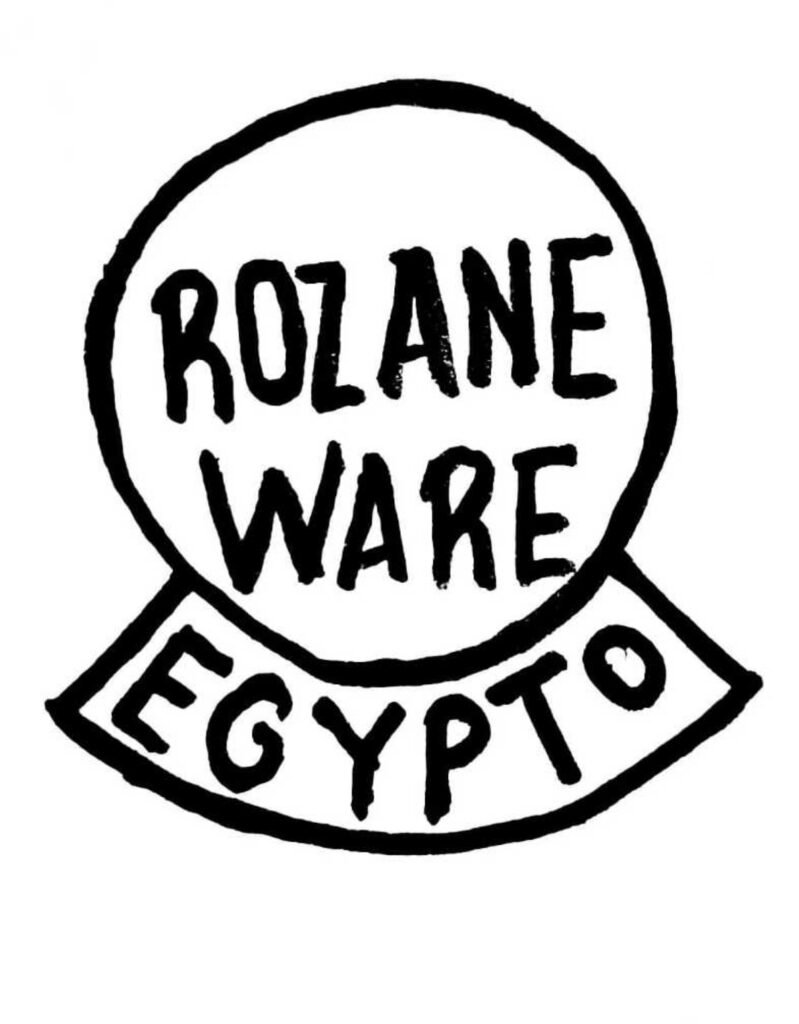
The Rozane Egypto line (1905-06) bears a ROZANE WARE/EGYPTO wafer mark on the base.

The Rozane Woodland pottery has a ROZANE WARE/WOODLAND wafer mark, circa 1905-06.

Roseville Mongol Line (1905-06) has a raised wafer mark with ROZANE WARE/MONGOL.
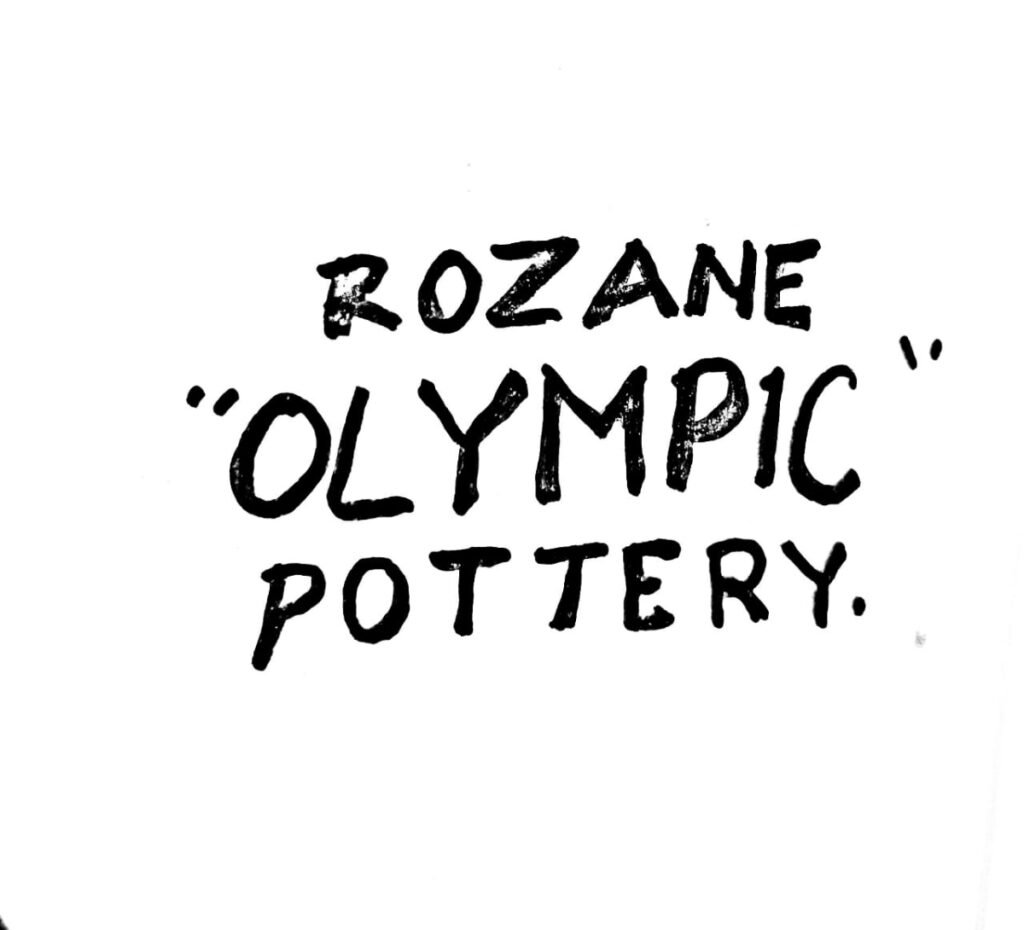
The Rozane Olympic pottery from 1905 is often found with a black hand-written ROZANE “OLYMPIC” POTTERY mark.
3. 1910s-1920s Roseville Marks & Stamps:
In the 1910s, Roseville company moved to more stylized raised and stamped marks as follows:

During 1910-28, Roseville marked its production with a blue ink “Rv” mark stamped on the base.

Roseville pottery made during 1914-33 displays a dark gray metallic silver “ROSEVILLE POTTERY” paper label.

The Donatello line from 1916 displays a round raised mark with “DONATELLO/ RPCo” incised on it on the product’s bottoms.
4. 1920s-1954 Roseville Company Marks:

Many 1925-35 Roseville pieces only have a crayon-stamped shape number marking.

This diamond-shaped Roseville metallic silver label with “ROSEVILLE POTTERY Rv” is found on the Roseville pottery from 1930-37.

Roseville pieces from 1936-38 can also have a unique, incised “ROSEVILLE” mark with shape and size number (etched).

This “ROSEVILLE U.S.A.” mark with shape and size numbers can be found on the Roseville pottery manufactured in 1939-54.
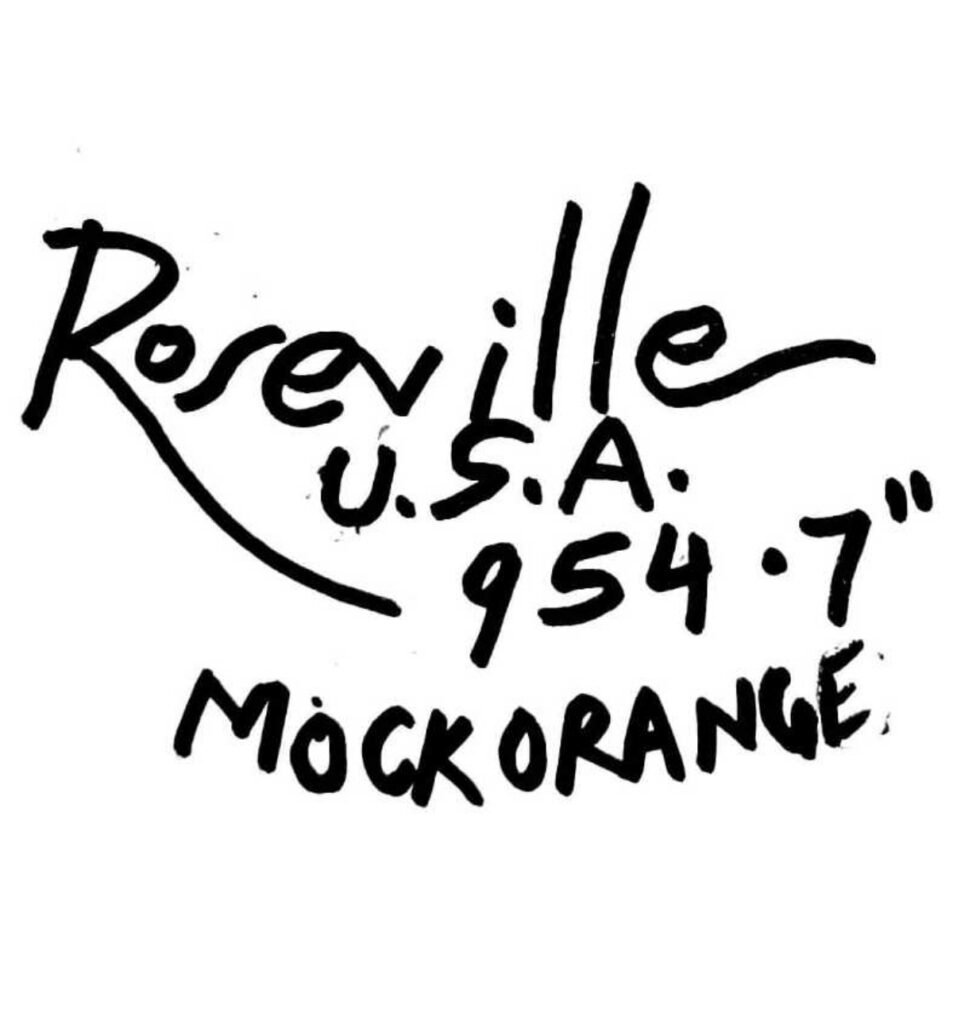
One of Roseville’s later pattern lines, the Roseville Mock Orange pottery made during 1951-54, has a raised “ROSEVILLE U.S.A./MOCK ORANGE” mark with shape and size numbers.

Roseville’s second last pattern line in 1953-54, Raymor, occasionally displays a mold-raised “PatPend RAYMOR ROSEVILLE U.S.A./Overproof” mark with shape numbers.

The raised “U.S.A” mark with mold-raised shape and size numbers are found on Roseville’s last pottery line Keynote from 1954-56. Mostly, “U.S.A.” and numbers are molded in opposite directions.
Roseville Pottery Trial Colors, Shapes, & Sizes
Roseville Pottery Co. also produced some “trial” pottery pieces. These pieces technically have a different shape, color, or size than those of a specific line.

A handmade “TRIAL” stamp under the glaze is found on some rare Roseville trial pieces.
But, the “TRIAL” stamp is not necessarily found on all trial Roseville pieces. Some are simply hand-marked with some letters and numbers. But these marks are always made under the glaze.
Import Roseville Marks (Reproduction) During the 1990s-2010
After its shutdown in the mid-1950s, Roseville items became hype again in the 1990s among collectors. Taking advantage of the situation, many companies started reproducing Roseville pottery with its expired trademarks.
These reproduction Roseville pottery pieces were manufactured in China and, hence, are cited as “import Roseville pottery.” Most 1990-2010 import Roseville pieces have raised in-mold marks as follows:


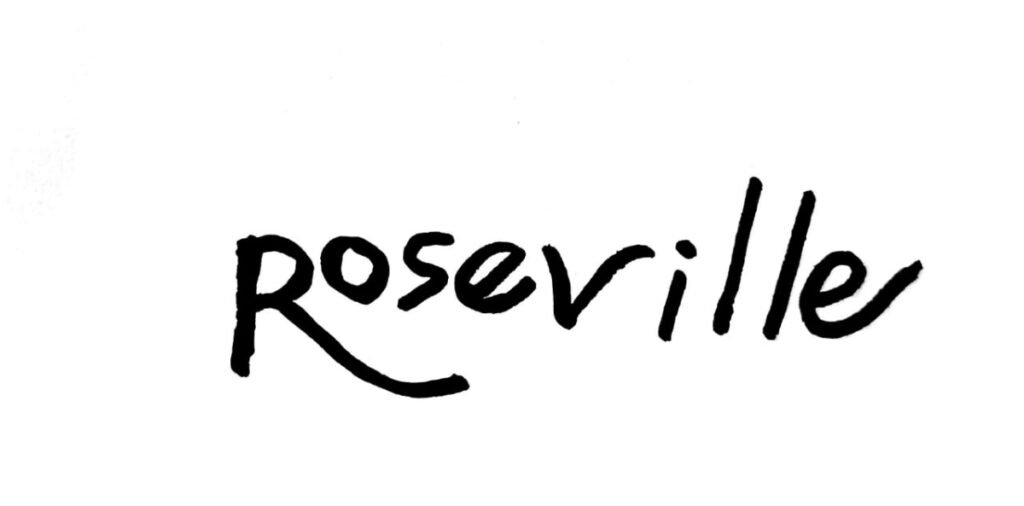


The main difference between real and reproduction marks is seen in the letters. For example, the round “S” and short “R” of Roseville. Besides, all the letters in the reproduced marks are mostly straight, unlike the real ones, which are slightly slanted.
The USA mark is another varying feature; in most reproduction pieces, the USA mark is missing. But then, some real Roseville pieces also do not have the USA mark, so you have to check other marking features, too!
This Roseville Pottery marks guide will surely help you identify and age any product with its marks and stamps. Along with these marks, you can also find artists’ initials on the bottom. Join me to learn all about these Roseville Pottery Artist Signs now!
Note: This article is intended for informational, educational, and entertainment purposes only. Some images are illustrative and may not represent actual brands, products, or related entities. All trademarks, product names, brand logos, packaging, and other intellectual property referenced remain the exclusive property of their respective owners. Any brand mentions or references are provided solely for descriptive and educational context and do not imply any formal or commercial association.




